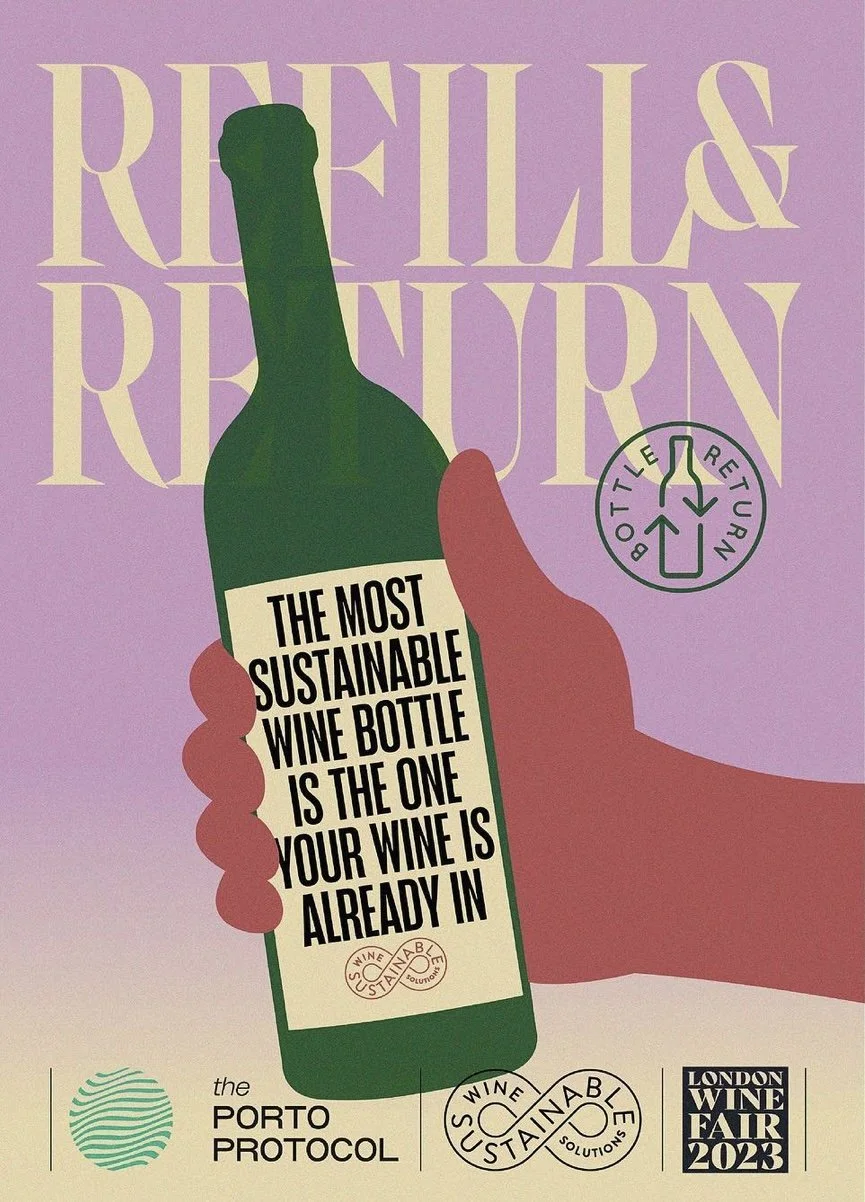Drink, refill and drink again.
Are refillable bottles the future of the wine industry?
Accelerated resource consumption and accumulating waste in the ‘Anthropocene’ (Crutzen and Stoemer, 2000) is eroding the planet’s capacity to support life as we know it and we can no longer rely on recycling as our primary solution — if anything it should be the last resort.
In the previous post we looked at sustainable packaging innovations making a splash in the world of wine, designed with the intention to address key challenges caused by incumbent packaging in the industry. However, these alternatives are not a solution to all ills of the glass bottle - at the end of the day, cans, paper and cardboard all have to be disposed of too. And although all these materials are (in theory) recyclable, the reality is that only 44.6% of waste from households is recycled (Gov.uk, 2023), a despondent amount. In our endeavour toward a sustainable and just future, “recycling should be thought of as a distant ‘end of life’ strategy prior to final disposal” (Charter 2018) and reuse should be the industry standard. Enter, refillable wine bottles.
“We love recycling but we believe that it doesn’t go far enough in reducing waste and carbon footprint.”
SustainableWineSolutions is the Greenwich based wine wholesaler championing reuse. Their Bottle Return Scheme “brings a new, sustainable lease of life to the traditional wine bottle” (SustainableWineSolutions, n.d.), with each bottle reusable for at least 30 refills. The refillable model maximises the bottle’s value over its life cycle, breaking away from the current linear chain of ‘take, make and waste’ (Charter, 2018) and embracing product circularity. By offering their refillable wine service, SustainableWineSolutions engenders lower energy use, reduction of waste to be landfilled (Pougnet et al., 2022), and fewer emissions generated by the recycling and disposal of the old bottle (or can or box).
When compared to alternate single-use packaging, reusable glass bottles emit 85% less carbon emissions than glass, 57% fewer emissions than aluminium and 88% less than BIB (Coelho et al., 2020). That is not to say, however, that reusable bottles are free of encumbrance, as their initial production remains to be burdensome and arguably more so than single-use bottles, considering reusable packaging is often made to be stronger and a bit heavier “in order to withstand the rigours of multiple cycles throughout its lifetime” (Coelho et al., 2020). Nevertheless, for reusable wine bottles, production emissions become more insignificant with each (re)use since the overall environmental impact is divided throughout the number of cycles — in case you needed another reason to treat yourself to a bottle of wine more often.
A Final Word
If the wine industry is to move toward more sustainable patterns of consumption and production whilst continuing to use their preferred recipient for bottle aging and extended shelf-life, reuse is the key. For reuse to become more prevalent, both wine producers and consumers should change their packaging purchasing priorities (Cole-Johnson, 2023) and opt for refill over weighty single use bottle.
Bibliography
CHARTER, M., (2018). Designing for the Circular Economy. London: Routledge.
COELHO, P.M., CORONA, B. & WORRELL. E. (2020). A Review of Environmental Impacts REUSABLE vs SINGLE-USE PACKAGING. Available at: https://zerowasteeurope.eu/wp-content/uploads/2020/12/zwe_reloop_executive-summary_reusable-vs-single-use-packaging_-a-review-of-environmental-impact_en.pdf. [Accessed: 18 November 2023]
COLE-JOHNSON , S. (2023). ‘Could Reuse Be the Future of Wine Packaging?’ SevenFifty Daily [online]. Available at: https://daily.sevenfifty.com/could-reuse-be-the-future-of-wine-packaging/ [Accessed 18 Nov 2023].
CRUTZEN, P.J & STOERMER, E.F (2000) "“The ‘Anthropocene’’’ The Future of Nature: Documents of Global Change. New Haven: Yale University Press, 2013, pp. 479-490. Available at: https://doi.org/10.12987/9780300188479-041 [Accessed 18 November 2023]
POUGNET, S., MARTIN-RIOS, C., & PASAMAR, S. (2022). ‘Keg Wine Technology as a Service Innovation for Sustainability in the Foodservice Industry’. Journal of Cleaner Production 360, 132145.
‘UK Statistics on Waste’. (2023). GOV.UK [online]. Available at:https://www.gov.uk/government/statistics/uk-waste-data/uk-statistics-on-waste#:~:text=The%20recycling%20rate%20for%20waste. [Accessed: 18 November 2023]

